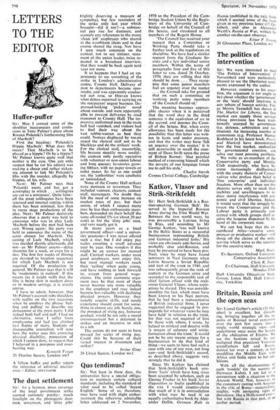The dust settlement
Sir: to a layman, press coverage of the local government strike seemed curiously patchy: much limelight on the photogenic dust- men, sewcrmen, and 'dirty jobs' (rightly deserving a measure of sympathy), but few reminders of the strike only last year which brought—did it not?—a substan- tial pay rise for dustmen; and scarcely any references to the many 'clean job' employees who shared in the exorbitant claim and in due course shared the swag. Nor have I seen 'much comment on the cynical, not to say sinister, state- ment of the union leader, twice re- peated in a broadcast interview, that they would be back again next year for more.
It so happens that I had an op- portunity to see something of the strike in London's administrative centre, County Hall. Delivery of post to departments became spas- modic, and was apparently conduc- ted sub rosa. so Heaven knows what delays occurred in carrying on the ratepayers' urgent business. De- pressed-looking 'pickets' stood about outside. and were appareindy able to prevent deliveries by road transport to County Hall. The im- pressive uniformed men in the main hall had vanished, and visitors had to find- their way about the vast rabbit-warren as best they could. Notices displayed by Ivaco urged the clerical staff not to be blacklegs and do the strikers' work. For the clerical staff, meanwhile, life became steadily more sordid: the canteen only partly operative with volunteer or non-union labour and long queues; lavatories. grow- ing filthier, with no paper towels or toilet paper. So far as one could see. the 'authorities' were apathetic or intimidated.
None of the County Hall strikers were dustmen or sewermen. They included vanmen, cleaners, canteen staff, messengers. No doubt they felt the need of some increase on modest rates of pay, but their union, of which I suspect many may be less than enthusiastic mem- bers. demanded on their behalf the same all-round 55s (or about 20 per cent) as for the 'dirty jobs' men, and very nearly got it.
In many years as a local government officer—and a univer- sity graduate—I was never offered such a rise; but I did enjoy pay scales ensuring a small advance year by year. One wonders if this might be an answer for manual staff. Clerical workers, under most good employers, now enjoy this, but most manual workers reach their 'ceiling' when quite young, and have nothing to look forward to, except from general wage- claims. The strict economic argu- ment may be that most of them never become any more valuable to the employer and may indeed become less valuable with declining physical powers. However, they usually acquire skills, and surely experience should count for some- thing in almost any job. Surely, too, the prospect of rising pay, however gradual, would be not only a moral encouragement but a deterrent to strikes and an incentive to stick to a lob.
The unions do not seem to have pressed for scales of rising pay. Could this be because of their vested interest in discontent and strikes?








































 Previous page
Previous page